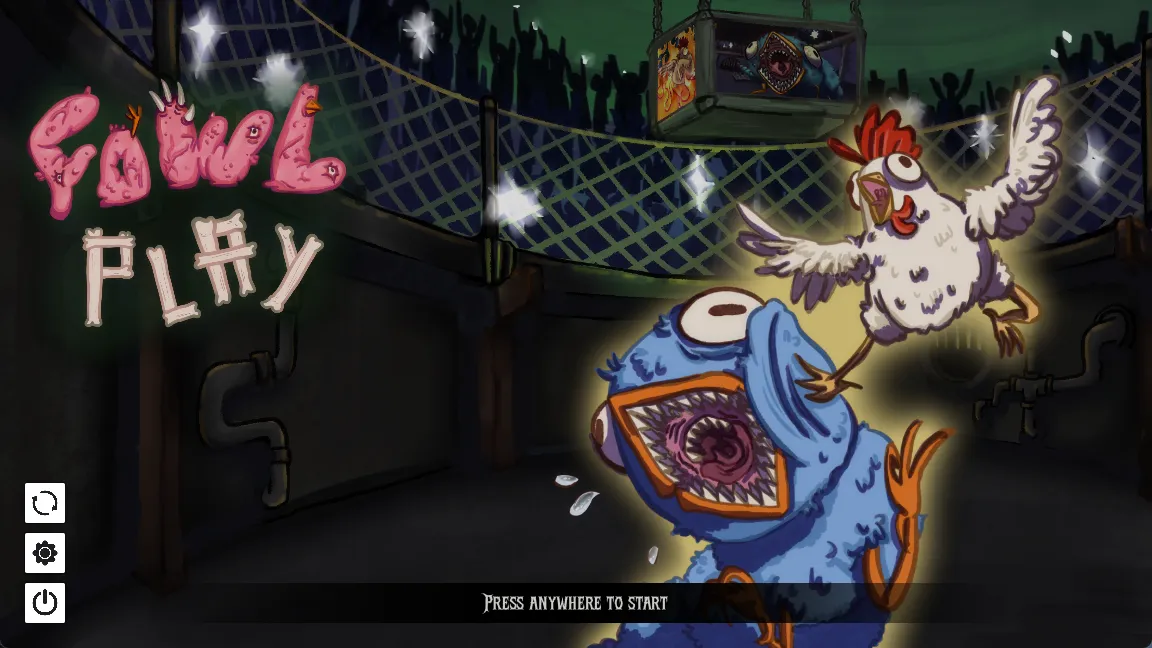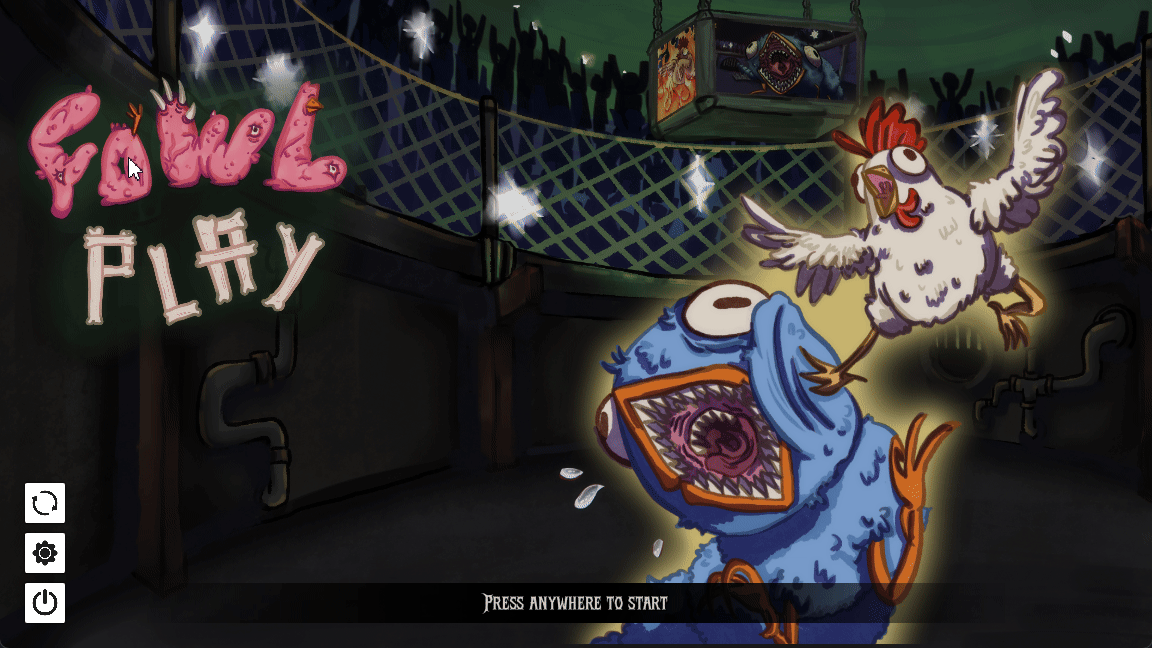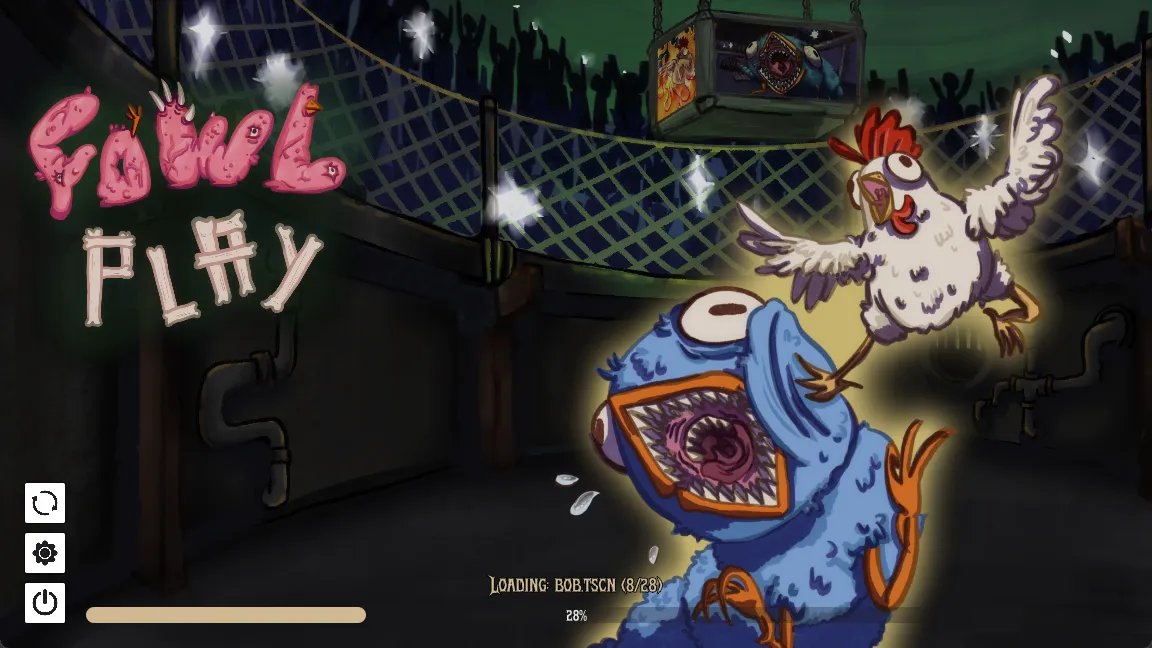Main Menu

The Main Menu is the first screen players see when launching Fowl Play. It serves as the central hub for starting the game, accessing settings, and viewing key art that establishes the game’s visual identity.
In Short
Section titled “In Short”The menu features several key interactive elements:
- Start Game: Begins a new game or continues a saved one.
- Settings: Opens the settings panel to adjust audio, video, and controls.
- Reset Save: A button to completely reset the save file, allowing the player to start from scratch.
- Exit Game: Closes the game.
On the Main Menu, the Main Menu Theme plays, which is an upbeat and catchy tune that sets a lighthearted and adventurous tone for the game.
Parallax Effect
Section titled “Parallax Effect”To add a fun element to the main menu, the background incorporates a parallax effect. Different layers of the background artwork move at different speeds in response to the player’s mouse movement.

Shader Preloading
Section titled “Shader Preloading”During playtesting, we noticed visual stutters when effects and shaders were first loaded in and encountered. These stutters went away on subsequent encounters, but reappear after the game closes.
To ensure a smooth gameplay experience without visual stuttering, Fowl Play preloads all necessary shaders and materials while the player is on the main menu. This process, often called “shader compilation,” can cause a brief hitch the first time a material or effect is rendered. By performing this step during the initial loading screen, these hitches are eliminated during actual gameplay.
This is sadly a process which seems to be needed on every startup, but an option has been made available in the settings menu under Graphics to disable preloading entirely.

The preloading system is composed of three main scripts that work together: the SceneScanner, the ShaderPreloader, and the ShaderPreloadManager.
Manager
Section titled “Manager”The ShaderPreloadManager is a high-level controller that orchestrates the entire process. It initializes the ShaderPreloader, connects to its signals to listen for progress updates, and provides a simple interface to start the preloading. This script acts as the bridge between the preloading system and the main menu’s UI, allowing it to display progress to the player.
class_name ShaderPreloadManagerextends Node
@onready var preloader: ShaderPreloader
var _total_scenes_to_preload: int = 0
func _ready() -> void: preloader = ShaderPreloader.new() add_child(preloader)
# Connect signals preloader.preloading_started.connect(_on_preloading_started) preloader.preloading_progress.connect(_on_preloading_progress) preloader.preloading_completed.connect(_on_preloading_completed) preloader.preloading_failed.connect(_on_preloading_failed)
func start_shader_preloading() -> void: print("Starting shader preloading...") preloader.start_preloading()
func _on_preloading_started(total_scenes: int) -> void: _total_scenes_to_preload = total_scenes print("Starting to preload ", total_scenes, " scenes")
func _on_preloading_progress( current_scene_index: int, scene_path: String) -> void: if _total_scenes_to_preload > 0: # current_scene_index starts at 0, so add 1 for progress display var progress: int = round( ((current_scene_index + 1) * 100.0) / _total_scenes_to_preload ) print("Progress: ", progress, "% - Loading: ", scene_path.get_file()) else: print( "Loading: ", scene_path.get_file(), " (Total scenes not determined yet)" )
func _on_preloading_completed() -> void: print("All shaders and materials preloaded successfully!")
func _on_preloading_failed(error: String) -> void: print("Preloading failed: ", error)
# This function is called to initiate the shader preloading processfunc preload_all_shaders() -> void: start_shader_preloading()
# Wait for completion await preloader.preloading_completedThe Main Menu script calls preload_all_shaders() to start the preloading process when the menu is ready. It adds the preload manager as a child node, so the scenes and its materials and shaders can actually enter the tree.
func _setup_shader_preloading() -> void: preload_manager = ShaderPreloadManager.new() add_child(preload_manager)
# Connect signals if preload_manager.preloader: preload_manager.preloader.preloading_started.connect(_on_preloading_started) preload_manager.preloader.preloading_progress.connect(_on_preloading_progress) preload_manager.preloader.preloading_completed.connect(_on_preloading_completed) preload_manager.preloader.preloading_failed.connect(_on_preloading_failed) else: printerr("MainMenu: Preloader not ready in ShaderPreloadManager during _setup_shader_preloading.")
# Start preloading preload_manager.preload_all_shaders()Scene Scanning
Section titled “Scene Scanning”The SceneScanner is a utility script responsible for finding all relevant game scenes that need to be preloaded. To avoid scanning the entire project every time the game launches, it runs once and caches the results in a configuration file. This file is automatically regenerated whenever the game’s version number changes, ensuring the list of scenes is always up-to-date with the latest build. This is important, since looping over all folders and files, even with optimizations, is slow and a process we would like to avoid as much as possible.
The scanner is optimized to:
- Exclude Unnecessary Directories: It skips directories like
addons,ui, andartthat don’t contain gameplay scenes with complex shaders. - Exclude Specific Scenes: It ignores certain base or utility scenes that are never instanced directly.
- Identify Top-Level Scenes: It intelligently detects scenes that are instanced within other scenes. Only “top-level” scenes are added to the preload list, as their sub-scenes will be processed automatically when the parent is loaded. This prevents redundant work and speeds up the process.
class_name SceneScannerextends RefCounted
# Location to store the scene paths to preloadconst CONFIG_FILE_PATH: String = "user://shader_preload_config.json"# Directories to exclude from scanningconst EXCLUDED_DIRECTORIES: Array[String] = [ "addons", ".godot", ".import", "export", # Exported game assets, doesn't contain anything actually used in the game "ui", # UI Scenes, minimal shader and material use "utilities", "resources", "art", # Art assets]# Scenes to exclude from preloading (filenames)const EXCLUDED_SCENES: Array[String] = [ "main.tscn", "ability.tscn", "enemy.tscn", "enemy_melee_handler.tscn", "base_melee_weapon_model.tscn", "base_ranged_weapon_model.tscn",]
# Helper to collect all .tscn files using ResourceLoader.list_directorystatic func _collect_all_tscn_files_rl( current_dir_path: String, scene_paths_array: Array[String]) -> void: # Ensure current_dir_path ends with a slash for consistency with list_directory var normalized_dir_path: String = current_dir_path if not normalized_dir_path.ends_with("/"): normalized_dir_path += "/"
var entries: PackedStringArray = ResourceLoader.list_directory( normalized_dir_path )
# list_directory returns an empty array if path doesn't exist or can't be read if entries.is_empty(): # Optional: Check if the directory itself exists if needed for more detailed logging # if not ResourceLoader.has(normalized_dir_path): # This might not work for dirs # printerr("SceneScanner: Directory not found or inaccessible: ", normalized_dir_path) return # Nothing to process in this directory
for entry_name in entries: # Skip hidden files/directories (e.g., .gdignore, .DS_Store) if entry_name.begins_with("."): continue
var full_item_path: String = normalized_dir_path.path_join(entry_name)
if entry_name.ends_with("/"): # It's a directory var dir_name_only: String = entry_name.trim_suffix("/") if dir_name_only in EXCLUDED_DIRECTORIES: continue # Skip this excluded directory # Recurse into subdirectories _collect_all_tscn_files_rl(full_item_path, scene_paths_array) elif entry_name.ends_with(".tscn"): # It's a file, check if it's a .tscn if not (entry_name in EXCLUDED_SCENES): scene_paths_array.append(full_item_path)
static func scan_project_scenes() -> Array[String]: var context_msg: String = "(Editor)" if Engine.is_editor_hint() else "(Exported Game)" print( "SceneScanner: ", context_msg, " Starting scene scan using ResourceLoader.list_directory..." )
var all_candidate_scenes: Array[String] = [] _collect_all_tscn_files_rl("res://", all_candidate_scenes)
if all_candidate_scenes.is_empty(): print( "SceneScanner: ", context_msg, " No .tscn files found after scan and filtering. This could mean:\n", " - No scenes exist in the project that meet the criteria.\n", " - All scenes were filtered out by EXCLUDED_DIRECTORIES or EXCLUDED_SCENES.\n", " - ResourceLoader.list_directory could not access 'res://' or subdirectories (check export settings if in exported game)." )
var instanced_scenes_by_others: Dictionary = {}
for scene_path in all_candidate_scenes: var packed_scene: PackedScene = ResourceLoader.load( scene_path, "PackedScene", ResourceLoader.CACHE_MODE_IGNORE # Avoid issues with cached versions ) if packed_scene: var temp_instance: Node = packed_scene.instantiate( PackedScene.GEN_EDIT_STATE_DISABLED ) if temp_instance: _recursively_find_instanced_sub_scenes( temp_instance, instanced_scenes_by_others, scene_path ) temp_instance.queue_free() else: printerr( "SceneScanner: Failed to instantiate (disabled) ", scene_path ) else: printerr("SceneScanner: Failed to load PackedScene for ", scene_path)
var scenes_to_preload: Array[String] = [] for scene_path in all_candidate_scenes: if not instanced_scenes_by_others.has(scene_path): scenes_to_preload.append(scene_path)
print( "SceneScanner: Found ", all_candidate_scenes.size(), " total candidate scenes after filtering." ) print( "SceneScanner: Identified ", instanced_scenes_by_others.size(), " scenes that are instanced by others." ) print( "SceneScanner: Will preload ", scenes_to_preload.size(), " top-level scenes." ) return scenes_to_preload
static func _recursively_find_instanced_sub_scenes( node: Node, instanced_scenes_set: Dictionary, current_parsing_scene_path: String) -> void: if ( node.scene_file_path != "" and node.scene_file_path != current_parsing_scene_path ): instanced_scenes_set[node.scene_file_path] = true
for child_node in node.get_children(): _recursively_find_instanced_sub_scenes( child_node, instanced_scenes_set, current_parsing_scene_path )
static func save_scene_config(scene_paths: Array[String]) -> void: var config_data: Dictionary = { "version": ProjectSettings.get_setting( "application/config/version", "unknown" ), "generated_at": Time.get_datetime_string_from_system(), "scene_count": scene_paths.size(), "scenes": scene_paths, }
var file: FileAccess = FileAccess.open(CONFIG_FILE_PATH, FileAccess.WRITE) if file: file.store_string(JSON.stringify(config_data, "\t")) file.close() print( "SceneScanner: Scene config saved with ", scene_paths.size(), " scenes to ", CONFIG_FILE_PATH ) else: printerr( "SceneScanner: Failed to save scene config to ", CONFIG_FILE_PATH )
static func load_scene_config() -> Array[String]: var scene_paths: Array[String] = [] var current_project_version: String = ProjectSettings.get_setting( "application/config/version", "unknown" ) var needs_regeneration: bool = false
if not FileAccess.file_exists(CONFIG_FILE_PATH): print( "SceneScanner: Config file not found: ", CONFIG_FILE_PATH, ". Flagging for regeneration." ) needs_regeneration = true else: var file: FileAccess = FileAccess.open(CONFIG_FILE_PATH, FileAccess.READ) if file: var json_string: String = file.get_as_text() file.close()
var json = JSON.new() var parse_result = json.parse(json_string)
if parse_result == OK: var config_data = json.data if not config_data is Dictionary: printerr( "SceneScanner: Invalid config file format (root is not a Dictionary). Flagging for regeneration." ) needs_regeneration = true else: var config_version: String = "" if config_data.has("version"): config_version = config_data.version
if config_version != current_project_version: print( "SceneScanner: Config version mismatch (config: '", config_version, "', project: '", current_project_version, "'). Flagging for regeneration." ) needs_regeneration = true else: if config_data.has("scenes") and config_data.scenes is Array: for scene_path_variant in config_data.scenes: if scene_path_variant is String: if ResourceLoader.exists( scene_path_variant, "PackedScene" ): scene_paths.append(scene_path_variant) else: print( "SceneScanner: Scene from config not found or not a PackedScene: ", scene_path_variant ) print( "SceneScanner: Loaded ", scene_paths.size(), " scenes from config." ) else: printerr( "SceneScanner: Invalid config file format (missing 'scenes' array or wrong type). Flagging for regeneration." ) needs_regeneration = true else: printerr( "SceneScanner: Failed to parse config file JSON: ", json.get_error_message(), " at line ", json.get_error_line(), ". Flagging for regeneration." ) needs_regeneration = true else: printerr( "SceneScanner: Failed to open config file for reading: ", CONFIG_FILE_PATH, ". Flagging for regeneration." ) needs_regeneration = true
if needs_regeneration: print("SceneScanner: Attempting to regenerate scene config...") generate_and_save_config() # This calls scan_project_scenes
scene_paths.clear() # Clear any paths loaded from an old/invalid config var new_file: FileAccess = FileAccess.open( CONFIG_FILE_PATH, FileAccess.READ ) if new_file: var new_json_string: String = new_file.get_as_text() new_file.close() var new_json = JSON.new() var new_parse_result = new_json.parse(new_json_string) if new_parse_result == OK: var new_config_data = new_json.data if new_config_data is Dictionary and new_config_data.has("scenes") and new_config_data.scenes is Array: for scene_path_variant in new_config_data.scenes: if scene_path_variant is String: if ResourceLoader.exists( scene_path_variant, "PackedScene" ): scene_paths.append(scene_path_variant) else: print( "SceneScanner: Scene from newly generated config not found/invalid: ", scene_path_variant ) print( "SceneScanner: Loaded ", scene_paths.size(), " scenes from newly generated config." ) else: printerr( "SceneScanner: Newly generated config is invalid (e.g., missing 'scenes' array or not a Dictionary)." ) else: printerr( "SceneScanner: Failed to parse newly generated config JSON: ", new_json.get_error_message(), " at line ", new_json.get_error_line() ) else: printerr( "SceneScanner: Failed to open newly generated config for reading: ", CONFIG_FILE_PATH ) # If reading new config fails, scene_paths will be empty, which is the correct fallback.
return scene_paths
static func generate_and_save_config() -> void: var context_msg: String = "(Editor)" if OS.has_feature("debug") else "(Exported Game)" print( "SceneScanner: ", context_msg, " Starting project scan to generate config..." )
var scene_paths_to_save: Array[String] = scan_project_scenes() save_scene_config(scene_paths_to_save)Scene Preloading
Section titled “Scene Preloading”The ShaderPreloader script does the heavy lifting. It takes the list of scenes from the config file and processes them one by one.
Its core responsibilities are:
- Asynchronous Operation: It uses Godot’s threaded loading to fetch scene data without freezing the main thread, allowing the UI to remain responsive.
- Forcing Shader Compilation: For each scene, it recursively finds all unique materials. To force the GPU to compile the associated shader, it creates a tiny, temporary
MeshInstance3D, applies the material to it, and adds it to the scene tree for a few frames. - Handling Particle Systems: It specifically finds and starts particle systems (
GPUParticles3DandCPUParticles3D) to ensure their shaders are also compiled. - Progress Reporting: It emits signals to report its progress, which the
ShaderPreloadManageruses to update the loading screen UI.
class_name ShaderPreloaderextends Node
signal preloading_started(total_scenes: int)signal preloading_progress(current_scene: int, scene_path: String)signal preloading_completed()signal preloading_failed(error: String)
var _is_preloading: bool = falsevar _preload_scene: Node3D # Node to temporarily host instanced scenes/meshesvar _processed_materials: Dictionary = {} # To track unique materials globally
const FRAMES_FOR_MATERIAL_BATCH_PROCESSING: int = 4const FRAMES_FOR_PARTICLE_PROCESSING: int = 5
func _ready() -> void: _preload_scene = Node3D.new() _preload_scene.name = "ShaderPreloadScene_Temporary" # Give it a unique name _preload_scene.visible = false # Keep it invisible add_child(_preload_scene)
func start_preloading() -> void: if _is_preloading: printerr("ShaderPreloader: Preloading already in progress.") return
var scene_paths: Array[String] = SceneScanner.load_scene_config() if scene_paths.is_empty(): var msg: String = "ShaderPreloader: No scenes found in config to preload." print(msg) emit_signal("preloading_failed", msg) return
_is_preloading = true _processed_materials.clear() emit_signal("preloading_started", scene_paths.size()) print("ShaderPreloader: Starting preloading of ", scene_paths.size(), " scenes.")
call_deferred("_start_async_preloading", scene_paths)
func _start_async_preloading(scene_paths: Array[String]) -> void: await _preload_scenes_async(scene_paths)
func _preload_scenes_async(scene_paths: Array[String]) -> void: for i in range(scene_paths.size()): var scene_path: String = scene_paths[i] emit_signal("preloading_progress", i + 1, scene_path) print( "ShaderPreloader: Preloading scene ", (i + 1), "/", scene_paths.size(), ": ", scene_path )
ResourceLoader.load_threaded_request(scene_path) var resource_status: ResourceLoader.ThreadLoadStatus = ResourceLoader.THREAD_LOAD_IN_PROGRESS
while resource_status == ResourceLoader.THREAD_LOAD_IN_PROGRESS: resource_status = ResourceLoader.load_threaded_get_status(scene_path) await get_tree().process_frame
if resource_status == ResourceLoader.THREAD_LOAD_LOADED: var packed_scene: PackedScene = ResourceLoader.load_threaded_get( scene_path ) if packed_scene: await _process_scene_resources_for_preloading(packed_scene) else: printerr( "ShaderPreloader: Failed to get PackedScene after loading: ", scene_path ) else: printerr( "ShaderPreloader: Failed to load scene (status: ", resource_status, "): ", scene_path )
await get_tree().process_frame # Small delay between scenes
_is_preloading = false print( "ShaderPreloader: Preloading completed. Processed ", _processed_materials.size(), " unique materials." ) emit_signal("preloading_completed")
func _disable_processing_recursive(node: Node) -> void: node.set_process_mode(Node.PROCESS_MODE_DISABLED) for child in node.get_children(): _disable_processing_recursive(child)
func _process_scene_resources_for_preloading(packed_scene: PackedScene) -> void: var instance: Node = packed_scene.instantiate( PackedScene.GEN_EDIT_STATE_DISABLED ) if not instance: printerr( "ShaderPreloader: Failed to instantiate scene: ", packed_scene.resource_path ) return
# Explicitly disable processing for all nodes in the instanced scene _disable_processing_recursive(instance) _preload_scene.add_child(instance) # Add main instance to our temp scene
# Collect all unique, new materials from the instantiated scene var materials_to_batch_process: Array[Material] = [] _recursive_collect_materials(instance, materials_to_batch_process)
# Batch process collected materials by creating temporary meshes if not materials_to_batch_process.is_empty(): var temp_mesh_instances_batch: Array[MeshInstance3D] = [] var temp_mesh_res := BoxMesh.new() # Create one mesh resource to reuse temp_mesh_res.size = Vector3(0.01, 0.01, 0.01) # Make it very small
for material_to_process in materials_to_batch_process: var temp_mesh_instance := MeshInstance3D.new() temp_mesh_instance.mesh = temp_mesh_res temp_mesh_instance.set_surface_override_material(0, material_to_process)
_preload_scene.add_child(temp_mesh_instance) # Add temp mesh to the same scene as the main instance temp_mesh_instances_batch.append(temp_mesh_instance)
_processed_materials[material_to_process.get_instance_id()] = true # Mark as globally processed #print("ShaderPreloader: Queued material for batch: ", material_to_process.resource_path if material_to_process.resource_path else "built-in/unique")
print( "ShaderPreloader: Processing batch of ", temp_mesh_instances_batch.size(), " materials for scene: ", packed_scene.resource_path ) for _i in range(FRAMES_FOR_MATERIAL_BATCH_PROCESSING): await get_tree().process_frame
for temp_mi in temp_mesh_instances_batch: temp_mi.queue_free()
if not temp_mesh_instances_batch.is_empty(): await get_tree().process_frame # Allow a frame for temp meshes cleanup
# Process particle systems await _process_particle_systems_in_node_recursive(instance)
# Clean up the main instanced scene instance.queue_free() await get_tree().process_frame # Allow a frame for main instance cleanup
func _recursive_collect_materials( node: Node, collected_materials_list: Array[Material]) -> void: if node is MeshInstance3D: var mi := node as MeshInstance3D for i in range(mi.get_surface_override_material_count()): var mat: Material = mi.get_surface_override_material(i) if mat and not (mat.get_instance_id() in _processed_materials) and not collected_materials_list.has(mat): collected_materials_list.append(mat) if mi.mesh: for i in range(mi.mesh.get_surface_count()): var mat: Material = mi.mesh.surface_get_material(i) if mat and not (mat.get_instance_id() in _processed_materials) and not collected_materials_list.has(mat): collected_materials_list.append(mat)
elif node is GPUParticles3D: var gpu_particles := node as GPUParticles3D if gpu_particles.process_material: var mat: Material = gpu_particles.process_material if mat and not (mat.get_instance_id() in _processed_materials) and not collected_materials_list.has(mat): collected_materials_list.append(mat)
var draw_pass_meshes: Array[Mesh] = [] if gpu_particles.draw_passes >= 1 and gpu_particles.draw_pass_1: draw_pass_meshes.append(gpu_particles.draw_pass_1) if gpu_particles.draw_passes >= 2 and gpu_particles.draw_pass_2: draw_pass_meshes.append(gpu_particles.draw_pass_2) if gpu_particles.draw_passes >= 3 and gpu_particles.draw_pass_3: draw_pass_meshes.append(gpu_particles.draw_pass_3) if gpu_particles.draw_passes >= 4 and gpu_particles.draw_pass_4: draw_pass_meshes.append(gpu_particles.draw_pass_4)
for mesh_in_pass in draw_pass_meshes: if mesh_in_pass: for i in range(mesh_in_pass.get_surface_count()): var mat_surf: Material = mesh_in_pass.surface_get_material(i) if mat_surf and not (mat_surf.get_instance_id() in _processed_materials) and not collected_materials_list.has(mat_surf): collected_materials_list.append(mat_surf)
elif node is CPUParticles3D: var cpu_particles := node as CPUParticles3D var material_to_check: Material = cpu_particles.material_override if material_to_check and not (material_to_check.get_instance_id() in _processed_materials) and not collected_materials_list.has(material_to_check): collected_materials_list.append(material_to_check)
if cpu_particles.mesh: # Also check mesh materials if no override or if override is different for i in range(cpu_particles.mesh.get_surface_count()): var mat_surf: Material = cpu_particles.mesh.surface_get_material(i) if mat_surf and not (mat_surf.get_instance_id() in _processed_materials) and not collected_materials_list.has(mat_surf): collected_materials_list.append(mat_surf)
if node.has_method("get_material_override"): # General material override var mat_override = node.get_material_override() if mat_override and not (mat_override.get_instance_id() in _processed_materials) and not collected_materials_list.has(mat_override): collected_materials_list.append(mat_override)
for child in node.get_children(): _recursive_collect_materials(child, collected_materials_list)
func _process_particle_systems_in_node_recursive(node: Node) -> void: if node is GPUParticles3D or node is CPUParticles3D: var particles: Node = node if particles.amount > 0: var original_emitting_state: bool = particles.emitting particles.emitting = true particles.restart() for _i in range(FRAMES_FOR_PARTICLE_PROCESSING): await get_tree().process_frame particles.emitting = original_emitting_state if not original_emitting_state: particles.restart() # Ensure particles are cleared if they weren't meant to be emitting
for child in node.get_children(): await _process_particle_systems_in_node_recursive(child)References
Section titled “References”This technique is based on the recommendations in the Godot Shader Documentation. See those docs for a more in depth explanation and potential future changes in newer Godot versions.